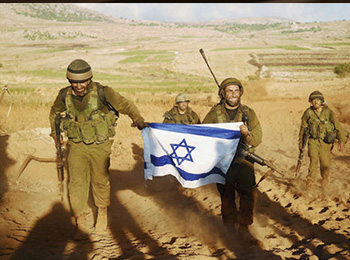I recently received the following from my son Guy, and share it as is with you, my CJN readers:
A spacious house on the shores of a clear, blue lake. Azure sky above. Mountains and forest all around. What more could one dream about?
A few months ago, after 18 demanding months of physical and mental exertion which included tests and challenges, sleepless nights, growth and maturation, “Ron” (a pseudonym) and I finally completed our training course for an IDF unit.
Ron is a “lone soldier” in the Israel Defence Forces (IDF), which means he came to Israel from the Diaspora to join the IDF. After the course’s graduation ceremony, Ron received permission from our commanders to visit his family in Canada, to rest a little and enjoy time with family and friends.
One hot, humid morning after Ron returned to Israel, I sat next to him during morning prayers. Ahead of us was a long, arduous day of training. Ron finished folding his tfillin and put them away, then stretched and gave a heavy sigh.
“Oh man, Achi (Bro)!” he said in his non-Israeli accent, “You have no idea how much fun I had! I almost forgot how much fun it is to jet-ski at our summer cottage. Just forgetting everything, water and wind in my face. Seeing all my childhood friends. Now they’re all in college, having a crazy time. Parties with no responsibilities. Good times.”
The key word for meaningful army service and volunteer work is “giving.” The primary measure of people’s actions is how much they are willing to give of themselves and their resources. But not all people are equal, in their ability to give, and/or in the effort they need to make. So a wealthy man who donates 10,000 shekels does not give more of himself than a youngster who donates 500 shekels from his bar mitzvah gifts.
Last week Ron left the base for a happy event. His younger sister came to Israel and joined the army. She was following in the footsteps of Ron and Ron’s younger brother, who is also a lone soldier. Their father flew to Israel from Canada especially for the occasion, and the three siblings and their proud father all celebrated together.
It is not clear or easy for Israeli soldiers to fully appreciate and understand the challenges of the lone soldier. In addition to adapting to a foreign language, a different culture and a different weather, when he goes “home” on weekend leave, Ron’s mother does not welcome him at the door with a loving hug and help him remove the heavy bag of dirty laundry from his shoulders. He does his own laundry (despite our offers to take his laundry home with us). He eats his Shabbat meals with host families, or sometimes, with friends. And prepares himself alone for the next week.
A rabbi at Yeshivat Ma’ale Gilboa where I studied says: “There is nothing more Jewish than an audible sigh.” He claimed it is a quintessential Jewish act of great significance.
I finished putting away my own tfillin and heard Ron’s sigh. I put an encouraging hand on his shoulder and said: “Ron, you already know that the reason you came to Israel, the Jewish homeland, was not for the college parties and beer or for wide lakes and evergreen forests. You came for the good friends who stand with you through hard times, and for causes worth the sacrifice. And those things Israel knows how to give.” — Guy Melamed
